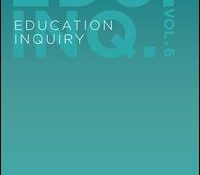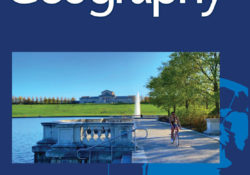tandfonline.com har udgivet en rapport under søgningen “Teacher Education Mathematics”: Abstract Abstract This paper centers on to evaluate whether and to what extent the learning objectives of the geography curricula emphasize students’ higher-order thinking skills (HOTS), and whether students are capable of answering to HOTS-questions by using the Finnish upper secondary geography education as an example. The revised Bloom’s taxonomy was used as a framework for the content analysis. The findings show that geography has the potential to enhance students’ HOTS, but students experience difficulties when answering to HOTS-questions. The results could be used to evaluate the desired thinking skills and knowledge dimensions in geography education for to enhance students meaningful learning. Link til kilde
Like this:
Like Loading...

tandfonline.com har udgivet en rapport under søgningen “Teacher Education Mathematics”: ABSTRACT ABSTRACT Competence-based education is a widely implemented educational approach, but more research is needed into the relationship between transversal competences and individual disciplines. In this article, we present the results of a study focusing on how the transversal competence of multiliteracy is contextually defined in Finnish local curricula in the disciplines of mathematics and social studies. The article offers new insights into the discussion between content- and competence-based educations by introducing the concept of disciplinary contextualisation. Based on the qualitatively analysed data, four different types of disciplinary contextualisation are presented and further discussed. The study also engages with the discussion in the field of multiliteracy by offering insights into the ways in which multiliteracy is rationalised, defined, and developed… Continue Reading →
Like this:
Like Loading...
eric.ed.gov har udgivet: California public schools serve a highly diverse student population, including: 65% minorities, 24.9% English Language Learners, 10.6% disabled, and 19% in poverty. In the face of this diversity, all teachers are expected to use the Curriculum Frameworks of the California State Board of Education as a “blueprint for implementing the content standards adopted by the California State Board of Education and are developed by the Curriculum Development and Supplemental Materials Commission.” The Curriculum Standards for California Public Schools and “No Child Left Behind” (NCLB) appear to have a goal of equal access to education for all students. “Education: The Promise of America” states that the goal of the NCLB legislation is to ensure that “all children are proficient in reading and math by the 2013-2014 school year”… Continue Reading →
Like this:
Like Loading...
eric.ed.gov har udgivet: The “MTP-Math/Science” curricula specifically target the teaching and learning of children at risk of early school failure, a population for whom achievement gaps in mathematics and science are visible even in Pre-K years. “MTP-Math” is based on Focal Areas defined by the National Council of Teachers of Mathematics (NCTM) (2006) for Pre-K through the 8th grade and developmental trajectories for Mathematics from Pre-K to grade two advanced by Clements (2004), and further focused through a review of state Pre-Kindergarten standards. In the authors’ earlier research with the “MTP” model to support language and literacy (Pianta, Mashburn, Luckner, Myers, & Kilday, 2008), the “MTP” teacher professional development program improved the quality of classroom interactions that Pre-K students experience, which in turn, promoted children’s development of language and literacy… Continue Reading →
Like this:
Like Loading...
tandfonline.com har udgivet en rapport under søgningen “Teacher Education Mathematics”: ABSTRACT ABSTRACT The study investigated changes in teaching practices and classroom processes, seen from a student perspective, before and after the education reforms of the 1990s, and the introduction of the Swedish 1994 National Curriculum for comprehensive school. The total time pass stretches from 1980 to 2014. The focus is on comparisons of results based on identical statements in questionnaires, given to six nationally representative student cohorts within the ongoing Evaluation Through Follow-up project, who attended grade 6 or grade 9. The findings show the working atmosphere in the Swedish grade-6 schools to have improved during the 1980s, pointing also to changes in the teacher role. Teacher-led class teaching was in less use than in previous decades, but still the… Continue Reading →
Like this:
Like Loading...
eric.ed.gov har udgivet: The purpose of this large-scale, national study is to determine whether some early elementary school math curricula are more effective than others at improving student math achievement, thereby providing educators with information that may be useful for making adequate yearly progress (AYP). This report presents results from the first cohort of first grade in 39 schools participating in the evaluation during the 2006-2007 school year, with the goal of determining the relative effects of different early elementary math curricula on student math achievement in disadvantaged schools. The report also examines whether curriculum effects differ for student subgroups in different instructional settings. A competitive process was used to select four curricula Investigations in Number, Data, and Space; Math Expressions; Saxon Math; and Scott Foresman-Addison Wesley Mathematics) that represent… Continue Reading →
Like this:
Like Loading...
eric.ed.gov har udgivet: National achievement data show that elementary school students in the United States, particularly those from low socioeconomic backgrounds, have weak math skills (National Center for Education Statistics 2009). In fact, data show that, even before they enter elementary school, children from disadvantaged backgrounds are behind their more advantaged peers in basic competencies such as number-line ordering and magnitude comparison (Rathburn and West 2004). Furthermore, after a year of kindergarten, disadvantaged students still have less extensive knowledge of mathematics than their more affluent peers (Denton and West 2002). This study examines whether some early elementary school math curricula are more effective than others at improving student math achievement in disadvantaged schools. A small number of curricula, which are based on different approaches for developing student math skills, dominate… Continue Reading →
Like this:
Like Loading...
tandfonline.com har udgivet en rapport under søgningen “Teacher Education Mathematics”: ABSTRACT ABSTRACT This study analyses, in the light of peace educational theory, the presence and absence of peace elements in the Swedish national curriculum for compulsory schooling. Using the theoretical framework developed within the international Peace Education Curricular Analysis Project, content analysis and mixed methods we identify how the Swedish curriculum underscore and lack the peace elements of recognizing violence, non-violent conflict transformation and positive peace. Our analysis shows that the Swedish curriculum supports teaching and learning which may help pupils to identify violence in society and internationally, lack many aspects of non-violent conflict transformation (especially conflict resolution) and emphasize positive peace in numerous but limited ways. We find that many dimensions of peace are underscored in the syllabus of… Continue Reading →
Like this:
Like Loading...
eric.ed.gov har udgivet: Many U.S. children start school with weak math skills, and children from poor households lag behind those from affluent ones. These differences grow over time, resulting in substantial differences in math achievement by the time students reach grade 4. The federal Title I program provides financial assistance to schools with a high number or percentage of students from low-income households, to help all students meet state academic standards. Under the No Child Left Behind (NCLB) Act of 2001, these schools must make adequate yearly progress in meeting state-specific targets for proficiency in math and reading, with the goal of ensuring that all students are proficient in math and reading by 2014. To provide educators with information that may contribute to making adequate yearly progress, this large-scale national… Continue Reading →
Like this:
Like Loading...
eric.ed.gov har udgivet: This study aimed at assessing the training programs for Mathematics teachers at elementary stage on developed Curricula and attitudes toward teaching at Najran educational administration in Saudi Arabia. To achieve this objective, two instruments were developed, one of them measures the opinions of Mathematics teachers about the training programs and the other one measures their attitudes toward teaching the developed Curricula, which were distributed to (72) male and female Mathematics teachers at elementary stage. The results showed that training programs for Mathematics teachers are highly efficient in covering the theoretical background of the project of Mathematics development, content, methods of teaching, activities and educational aids, evaluation, and quality of training. The results also showed Math teachers have positive attitudes towards teaching the developed Curricula, and further concluded… Continue Reading →
Like this:
Like Loading...



